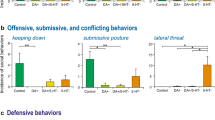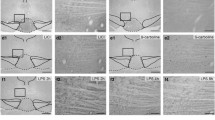Abstract
The effects of repeated administration of fluprazine, an “aggression”-reducing drug, were evaluated in mice using the target biting and resident-intruder paradigms. Under baseline conditions there was a high target biting rate immediately after the delivery of a 2.0 mA tail shock, an intermediate target biting rate during a 2-min intershock interval, and a low target biting rate during a 15-s tone stimulus which signaled the shock. During the 10-min resident intruder test sessions, resident males attacked bulbectomized intruders an average of six times with an average latency to the first attack of 258 s. In the prechronic dose-response curve determination, fluprazine caused a dose-dependent decrease in postshock and intershock interval target biting behavior, increased the latency to the first attack, and decreased the number of attacks in the intruder-evoked aggression paradigm. During the chronic administration of the ED50 dose of fluprazine, intershock interval target biting gradually increased to a level equal to those subjects receiving chronic saline. Moreover, a shift (to the right) in the during-chronic fluprazine dose-response curve for postshock and intershock interval target biting, was observed. Likewise, during the chronic administration of the ED50 dose of fluprazine, resident number of attacks gradually increased to a level equal to those subjects receiving chronic saline. However, no shift in the during-chronic dose-response curve was observed in subjects tested in this paradigm.
Similar content being viewed by others
References
Blanchard CD, Blanchard RJ (1984) Inadequacy of the pain-aggression hypothesis revealed in naturalistic settings. Aggress Behav 10:33–46
Bradford LD, Olivier B, Van Dalen D, Schipper J (1984) Serenics: The pharmacology of fluprazine and DU28412. In: Miczek KA, Kruk MR, Olivier B (eds) Ethopharmacological aggression research. Liss, New York, pp 191–207
Flannelly KJ, Muraoka MY, Blanchard CD, Blanchard RJ (1985) Specific anti-aggressive effects of fluprazine hydrochloride. Psychopharmacology 87:86–89
Flannelly KJ, Lim HL, Diamond M, Blanchard CD, Blanchard RJ (1986) Fluprazine hydrochloride decreases copulation in male rats. Pharmacol Biochem Behav 22:1–4
Gandelman R, Zarrow MX, Denenberg VH, Myers M (1971) Olfactory bulb removal eliminates maternal behavior in the mouse. Science 171:210–211
Olivier B, Mos J, Van der Poel AM, Krijzer FNC, Kruk MR (1984) Effects of a new psychoactive drug (DU27716) on different models of rat agonistic behaviour and EEG. In: Flannelly KJ, Blanchard RJ, Blanchard CD (eds) Biological perspectives on aggression. Liss, New York, pp 261–279
Olivier B, Van Dalen D, Hartog J (1986) A new class of psychotropic drugs: serenics. Drugs of the Future 11(6):473–494
Racine MA, Flannelly KJ, Blanchard CD (1984) Anti-aggressive effects of DU27716 on attack and defensive behaviors in male mice. In: Flannelly KJ, Blanchard RJ, Blanchard CD (eds) Biological perspectives on aggression. Liss, New York, pp 281–293
Van de Poll NE, Eerland EMJ, DeJonge FH (1986) Effects of fluprazine (DU27716) upon aggressive and sexual behavior of testosterone-treated female rats. Aggress Behav 12:293–301
Wagner GC, Carelli RM (1987) Effects of fluprazine (DU27716) and ethanol on target biting and intruder-evoked attacks. Psychopharmacology 91:193–197
Wagner GC, Beuving LJ, Hutchinson RR (1979) The effects of gonadal hormone manipulations on aggressive target-biting in mice. Aggress Behav 6:1–7
Author information
Authors and Affiliations
Rights and permissions
About this article
Cite this article
Carelli, R.M., Wagner, G.C. The effects of repeated administration of fluprazine on target biting and intruder-evoked attacks. Psychopharmacology 95, 476–481 (1988). https://doi.org/10.1007/BF00172958
Received:
Revised:
Issue Date:
DOI: https://doi.org/10.1007/BF00172958




